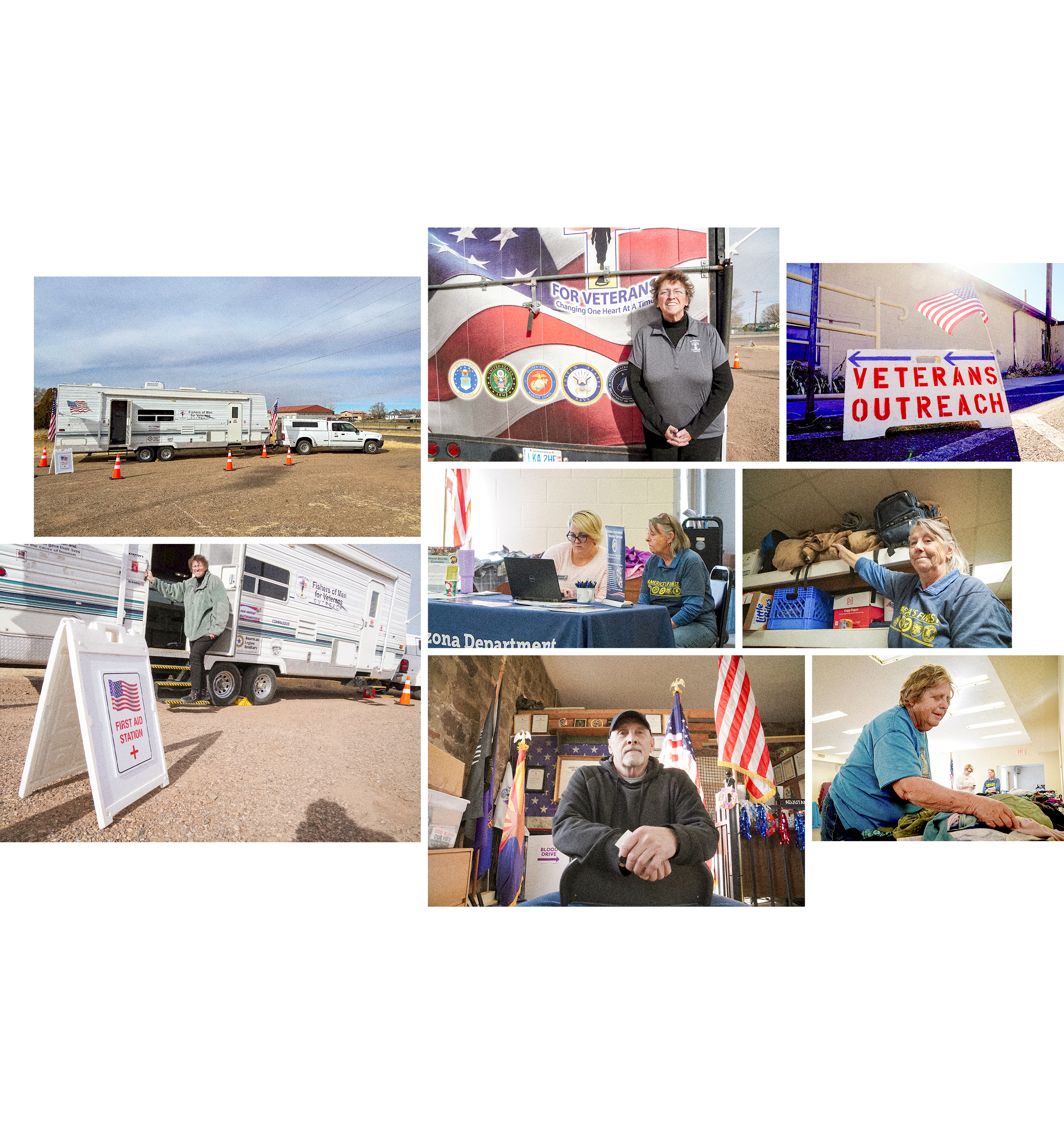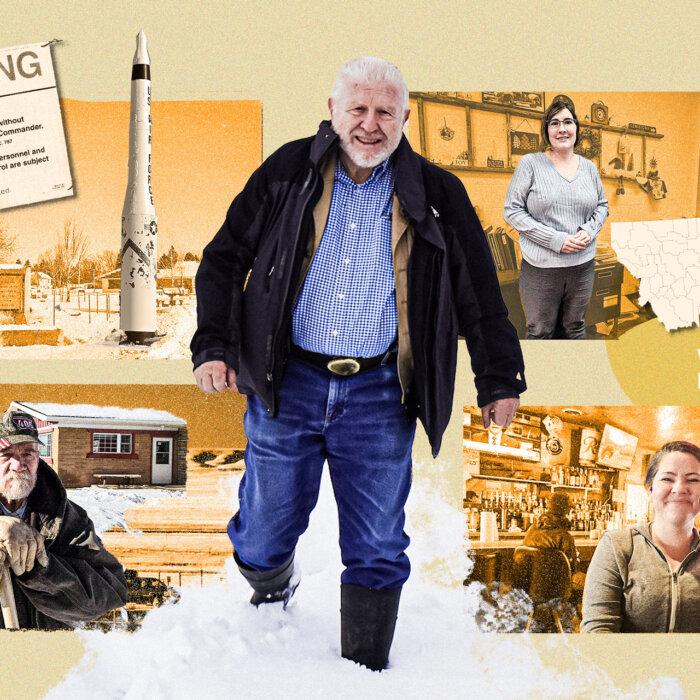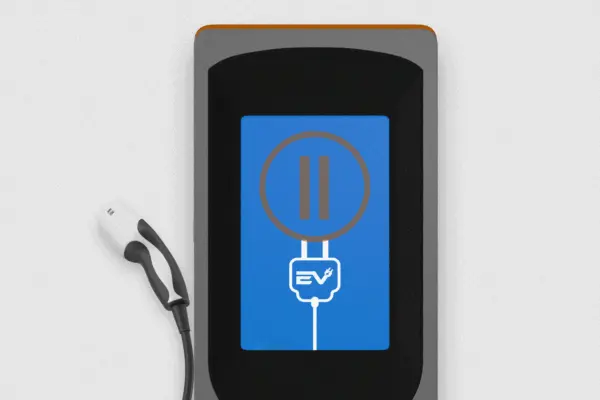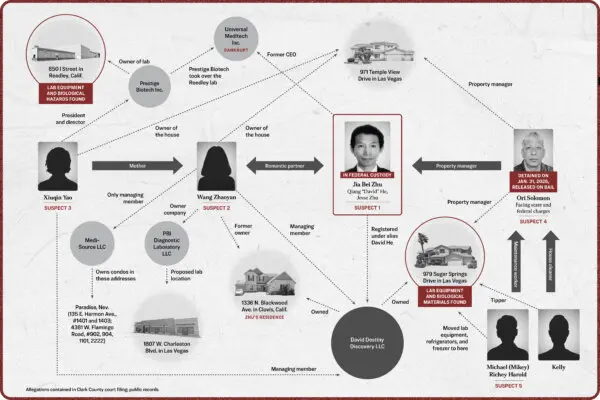HOLBROOK, Ariz.—Along the lonely stretch of highway between Navajo and Apache counties in east central Arizona, homeless veterans set up tents and shelters to find peace and privacy away from others.
Marty Jarvey, an outreach volunteer, frequently visits this remote area near the White Mountains to assist homeless veterans and individuals in need.
Typically, the encounters are productive. But she never knows what she will find.
This winter, Jarvey discovered the bodies of four male veterans who had succumbed to hypothermia. They had been living in makeshift shelters with little to call their own.
“I may seem strong on the outside,” said Jarvey, a former member of the Nurse Corps during the Vietnam War.
Still, she said, it is difficult to maintain that strength in the face of tragedy.
With each grim discovery she made, Jarvey found herself kneeling, crying, and praying for these lost souls.
As a founding member of Fishers of Men for Veterans, a nonprofit organization based in Lakeside, Arizona, Jarvey understands that death and suffering are part of the work.
Nonetheless, she remains steadfast in her mission: to assist homeless veterans in any location where they may be found.
Often, this involves actively searching for them as they inhabit isolated areas across two counties.
By Jarvey’s count, there are currently 139 homeless veterans in the area. She said there have been other unattended veteran deaths in the past few years.
“It’s not my first rodeo,” Jarvey told The Epoch Times about the deaths she discovered. “One was in a car; one was in an abandoned home.”
Another veteran had hanged himself in the woods.
These deaths underscore the increasing challenges faced by unsheltered veterans in Arizona, particularly in the state’s poorest counties, such as Apache and Navajo. Lakeside is located in Navajo County and Holbrook serves as the county seat there.
According to the Housing Assistance Council, which is supported by The Home Depot Foundation, there are currently 857 homeless veterans in Arizona, out of a total veteran population of 471,924.
The majority of these veterans—36.9 percent—served during Vietnam, while 21.7 percent served during the First Gulf War and 21.6 percent served in Iraq and Afghanistan in the early 2000s.

Counting the Homeless
In 2009, the Department of Housing and Urban Development (HUD) began officially estimating the U.S. homeless population—including veterans—using Point-in-Time counts as a metric to assess the fluid situation.In November 2024, HUD, the Department of Veterans Affairs (VA), and the U.S. Interagency Council on Homelessness (USICH) announced the 2024 Point-in-Time Count, which revealed an 11.7 percent decrease in nationwide homelessness since 2020.
In Tennessee, veteran homelessness had declined significantly, by 24.9 percent, since 2023.
“The challenge now is to end veteran homelessness and use the lessons we learn to help all people without a home.”

Despite yearly fluctuations, veteran homelessness has shown an overall decline, with the VA reporting a 52 percent decrease since 2010.
“Within the last three years alone, there has been approximately a 4 percent overall reduction in veteran homelessness,” the VA stated on its website.
“As with prior years, advocates for ending homelessness among veterans have eagerly awaited these results.”
Among unsheltered veterans, the USICH says, the number decreased by 10.7 percent from 15,507 in 2023 to 13,851 in 2024—one of the lowest levels in more than two decades.

Rural Challenges
The situation in east central Arizona is distinctive because the area attracts many homeless veterans who migrate north from the Phoenix metro area in search of tranquility among the lakes and pine trees, according to Jarvey.She said many veterans experience post-traumatic stress disorder (PTSD), as well as issues with drug and alcohol addiction. Some individuals have felony convictions connected to their experiences with combat trauma.
Many homeless veterans are often unprepared for cold weather when they arrive during spring and summer, Jarvey said.
“I know where the veterans are,” she said. “You’ll see a lot of them in the summertime. You’ll see their [camp] fires. They’re underneath the bridge [in Holbrook].
“I think [they come here] because of the economy—and they want to get away from the city.”
A significant part of the organization’s mission is to deliver essential items such as food boxes, blankets, sleeping bags, tents, clothing, and backpacks filled with supplies to homeless veterans. The nonprofit does this while operating on a tight budget that relies on private donations.
Recognizing that many homeless veterans lack transportation, the organization has converted a fifth-wheel recreational vehicle into a mobile health clinic.
Once a month, this moveable clinic provides health screenings, basic medical services, and supplies in the towns of Holbrook and Snowflake, Arizona.
The organization has partnered with others to assist homeless veterans, including volunteer doctors from the regional hospital in Springerville, Arizona, about 50 miles away from Lakeside.
“I think having these mobile clinics—especially with community partners—kind of reduces that gap [in services],” said Dana West, central outreach coordinator for the Arizona Department of Veterans Services.
“They bring the services to you. It helps build a rapport and trust. It plays a huge role in giving veterans the confidence to ask for help.”
Diane Anderson, a retired registered nurse and veteran who lives in Lakeside, offers her services as a mobile health clinic volunteer.
“We have a lot of homelessness up here because we’re so rural,” she said. “We don’t have a veteran’s hospital here.

“The nearest veteran’s hospital is in the valley. We do have a veteran’s clinic, although not every veteran is eligible for veteran’s health care.”
The shortage of resources for homeless veterans exacerbates the issue, Anderson said.
“We don’t have many psychiatrists and psychologists,” she said. “There are high diabetes rates.”
Many homeless veterans have health problems associated with exposure to Agent Orange in Vietnam. Others have severe emotional issues stemming from their combat experiences.
“[Veterans] see things that no human being should ever have to see,” Anderson told The Epoch Times. “The fastest way out is alcohol and drugs.”
“It’s a hard transition from being a civilian to being in the military and being a civilian [again], [especially with the loss of structure].
“They don’t have the rules, the support, the chain of command to back them up. And they’re trying to deal with anger. They’re dealing with horror. They’re dealing with nightmares.
‘It’s Getting Worse’
Cyndy Dulaney is a 67-year-old resident of Holbrook who served in the Army from 1976 to 1979.She currently lives in a motel for veterans located two miles from the senior center and food pantry and has a fixed monthly income of about $1,000, with approximately $800 allocated for rent.
At the senior center, Dulaney receives various donations of food, clothing, and toiletries. She also receives assistance with her Medicare application and other services.
However, she has not yet taken advantage of the free medical care offered by the mobile health clinic, which is available on the last Friday of each month.

Dulaney said her greatest challenge is navigating the town because she does not own a car and cannot afford alternative forms of transportation.
“It would be nice to be able to be closer,“ she said. “Even going to the [VA] clinic, I have to go up the hill. It’s a long walk.”
Dulaney said she is aware of the increasing number of homeless veterans in the area.
Without the motel, she “would be homeless,” she said.
“It’s getting worse,” Dulaney told The Epoch Times, noting that some homeless veterans cannot find a job because of their situation. “They can’t even get Social Security. They need to have an address.
“I see things getting higher and higher [in cost] for veterans and not being able to afford it.”
She said her saving grace is her little dog, Daiquiri. She said he is strawberry in color and a “real cutie.”
Caleb Overbay, a licensed agent with White Mountain Medicare, collaborates with Fishers of Men for Veterans to provide guidance to veterans applying for benefits and filing claims.
“Transportation is the biggest limiting factor for those individuals who need resources,” Overbay told The Epoch Times.
“That’s another reason why these events [at the senior center] can be helpful. They help get those resources to the public and allow a place for people to come to—but not if they don’t have transportation.”
Overbay said he estimates that there is a “significant, and in many ways unknown, homeless veterans population” in the area.
“We try to get an idea of where they’re at and how many veterans we have in the community,” he said. “It’s been difficult.”
Some homeless veterans choose not to seek help or resources and prefer to avoid community contact. They want to live independently and not be disturbed.

High-Risk ZIP Codes
West said in smaller towns in east central Arizona, outreach programs for homeless veterans are essential for their health and survival.“We are considered high-risk ZIP codes,” she said. “In the last couple of years, all of the reported suicides were among veterans.
“We’re really trying to pay attention to those areas.”
West said underemployment and ineligibility for social programs put many veterans at risk of homelessness.
“I know a lot of veterans who have been working, they’ve got a house, then they lose their job, then they lose their home,” she said.
In rural areas of Arizona, about 50 percent of veterans are older than 65, living on a fixed income or pension, and cannot afford to stay in homes, according to West.
“We’re seeing a lot of our veterans becoming homeless—and it’s devastating,” she said.
Scott Guffey, vice commander of American Legion Post 126, which serves Snowflake and Taylor, Arizona, said certain areas are “considerably worse” for homeless veterans than others.
“A lot of them will use the campsites,” he said. “There are several campsites in the area, and they’ll do the tents. They’re very private people.”
In the spring and summer, when the weather is nicer, the homeless veterans will slowly work their way north, seeking remote areas in which to cope with their emotional problems.
“Flagstaff is a big area where they congregate,” Guffey told The Epoch Times. “They’ll come up out of the valley [from Phoenix], and they’ll get to the Flagstaff area for the summer.”

Guffey named drug and alcohol use as among their most serious problems, along with PTSD.
“At this time of year, they are also suffering from exposure [to the elements],” he said.
“When the weather changes, they’re not ready—I mean, they don’t have a warm place or clothing to stay out of the weather. Then, they end up with COVID, the flu, or pneumonia.”
Guffey expressed optimism that the new Trump administration will enhance veterans’ services at the federal level.
“It’s very limited what [the VA] can do unless it’s service-related,“ he said. “Or they found something medically wrong. There are lots of veterans struggling to keep a job.”
Anderson said outreach volunteers encourage homeless veterans to leave the woods and mountains so they can receive the assistance they need—and deserve.
“They’re not terribly trusting,” she said. “You probably won’t ever meet a veteran who’s very trusting. We kind of learned that from the get-go.
“As a nurse, my calling is to take care of people. My role here—I see it as having an obligation to my brother and sister veterans who came home in worse shape than I did. That’s why I want to do this.”
Holbrook Vice Mayor Mike Nilsson posed the question, “How much is a [veteran’s] life worth?”
He said he believes that expanded outreach efforts and innovations, such as the mobile health clinic, are key components of that answer.
Two years ago, law enforcement called Jarvey for a well-being check on a homeless veteran. By the time she arrived, he had died from exposure.
Through such tragic encounters, outreach volunteers discover the true value of mercy, she said.
Fishers of Men for Veterans is “the grassroots“ of nonprofit service, Jarvey said. ”We go strictly on what God has given us.”



















